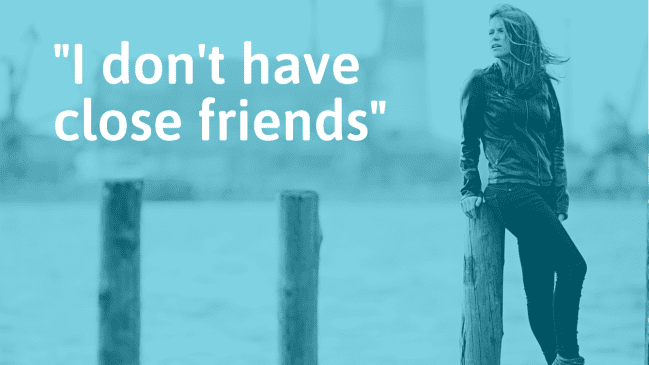Is it normal to have no close friends?
“I feel like I have a lot of “casual” friends, but no close friends. No best friends, nobody I really even hang out with. It gets me pretty down to think about, and I don’t feel like I have a strong support system.”
Lacking close friends is surprisingly common, with 27% of people aged 23-38 saying that they don’t have any close friends.[1] Acquaintances and casual friends can be fun, but close friendships give you a deeper sense of trust and belonging.
Turning those acquaintance relationships into close and fulfilling friendships will take time, but it is well worth the effort.
Part 1: Reasons you might not have close friends
Part 2: The benefits of close friendships
Part 1: Reasons you might not have close friends
This chapter covers several underlying reasons for not having close friends. It also contains advice on how to address these issues. Because this article focuses specifically on what to do if you don’t have close friends, you can also read our main article on not having any friends.
Not spending enough time with your friends
Developing a strong bond with a close friend can take longer than you might think, between 150-200 hours.[2] This time is spent sharing information about ourselves, building trust, and coming to value the other person’s contribution to our lives.
Making time for the other person and incorporating them into your life allows you to gradually increase the amount of time you are spending together.
There are ways to short-circuit this process, through sharing personal information regularly and asking the other person questions about themselves.
How to find ways to spend more times together with friends
For your friendships to deepen, take all opportunities that are offered you to spend time together and take your own initiative to meet with people.
- Consider blocking out a period of time in your diary each week to devote to your friends. If they’re not free to hang out, you could spend that time researching fun things to suggest for the future or catch up with another friend. You can research fun things to do in the winter or fun things to do in the summer with them, depending on the weather.
- Try to say yes to invites where possible. If you can’t make an event, suggest an alternative time when you could see them. This shows that you are still engaged in the friendship and helps to create a pattern of seeing each other that fits around your schedule.
- If you usually do something alone, such as studying or working out, think about if you know someone who might want to do it together.
Although some friendships become intense very quickly, it can be better to spread your ‘getting to know you’ time out. A text message or two per day is often preferable to silence all week and then a bunch of texts on Friday night.
Not daring to open up about yourself
Studies show that for two people to get to know each other, they have to know things about each other. The best way to increase closeness is by gradually, over the course of your friendship, increasing the amount of personal information you give about yourself and that you ask for from others.[3]
Sharing personal experiences and feelings can make us feel vulnerable. It means putting down many of our defenses and allowing the other person to see the real us, not the brave face that we put on for the rest of the world.
Opening up, although sometimes difficult, is what allows you to know that your friends understand you.
Practical advice on how to open up
Practice talking about what you think or feel. This helps people get to know you, and helps you bond as long as it’s not about controversial topics. Pay attention to if something’s holding you back from doing so – it could be the fear of being vulnerable or assuming that people don’t care.
Start with minor personal disclosures, such as a favorite band, and build gradually towards more important or vulnerable topics, such as hopes and fears. A helpful strategy is to share your feelings and opinions related to whatever you’re talking about. Then, ask your friend what their thoughts are on the topic.
Let’s say that you’re having a conversation about movie genres.
If you share what movie genres you like, you open up a little bit about yourself. You can ask your friend what genres they prefer, and now you got them to open up a little bit, too.
Now, you can take this one step further. You can ask them why you think they like the movie genres they do like. And likewise, you can try to analyze yourself in the same way and share with your friend.
Now, you’re moving from small talk about movies to actually getting to know each other.
Each conversation should start with small talk and move towards increased intimacy. This should always feel relaxed and comfortable but you may notice that there is less small talk as you become closer friends.
Putting too much pressure on your relationships
As I mentioned above, building friendships takes time. When you are feeling lonely, it can be tempting to try to push your relationships to become closer very quickly. This pressure can challenge a budding friendship.
You do want to be more personal with someone over time. However, asking a lot of personal questions is a common way to push for more intimacy. But be careful that it doesn’t feel like an interrogation.
If you ask a lot of questions, try offering statements that show your interest instead. Rather than “what was that like?” you could say “I’d love to hear more about that” or “I can’t imagine being in that situation”.
Aim for a balance between you and your friend
Balanced relationships feel relaxed and easy. Matching communication styles, in terms of the quantity and quality of communication is important for building a feeling of closeness.[4]
Friendships feel balanced when you both do the following things approximately equally:
- Sharing information about yourselves.
- Maintaining contact.
- Spending time talking vs listening.
- Replying quickly to messages.
Paying attention to the balance in your friendships will help you to maintain your close friends.
Read more in our guide on how to make close friends.
Being too independent
Being independent is generally considered a good thing, but close friends need to feel wanted and needed. Moving from acquaintances to close friends is about making space in your life for other people.
Sometimes, our independence is in reality a symptom of feeling insecure about forming close relationships. If you can relate to this, you can read up on attachment styles and how they affect your closest relationships.
Independent people can often be intimidating to approach, so invite others to join you in activities that you might normally do alone. Being invited allows others to feel wanted.
Don’t be afraid to mention that this is something you would normally do alone. Knowing that they have been invited into something that you already enjoy alone can make people feel special and valued.
How to make space in your life for close friends
Activities in which there is a shared goal or where it feels comfortable to share personal information are better for creating close friendships. A shared goal helps you to see how each other react to situations and to build trust, whilst quiet situations such as having a coffee and a chat make it easy to discuss a wide range of topics, including personal ones.
To create close friendships, invite acquaintances to interact one-on-one. Choose a low-stress environment in which you are unlikely to feel rushed. A trip to an art gallery is likely to be more effective in deepening a friendship than visiting a theme park.
Driving people away when they get too close
Sometimes, you can look back at past friendships and notice that you tend to push people away or find fault with them as soon as the friendship reaches a certain level of intimacy. Although you might want closer friends, this might be a sign that you are struggling to trust people.
If you notice that this is a common pattern for you, it is important to be honest with yourself. If you feel yourself disengaging from a friendship, ask yourself why and see how you feel about the answer.
Again, you might have an attachment style that makes it hard for you to form close bonds.
An attachment style is the type of way we form bonds with others. Some have avoidant attachment styles that make it hard for them to form close bonds. This is usually formed at a young age by the type of relationships we have with our parents. You can learn to identify your attachment style here.
How to become comfortable with intimacy
Learning to trust others can be a long, slow process. If this is an ongoing difficulty for you, it may be valuable to seek help from a trained therapist.
Research shows that experience with trusting relationships with friends or intimate partners can help to increase the security of your attachment style over time.[5]
Rather than pushing people away entirely when you feel nervous, try to lower the intimacy level a little. Spend a little longer on small talk and only share personal information that feels comfortable. This may allow you to feel comfortable again and give you the space to allow trust to build over a longer period.
Pulling away when life gets hard
When you are going through a difficult time it can be tempting to pull up the drawbridges and conserve all of your emotional energy until you’ve dealt with whatever has been going wrong. This is especially true when you haven’t had many close friends, as you might not have learned how to accept help and comfort from friends.
Pulling away from others when they know you’re in difficulties can come across as a lack of trust. Be honest with the people who care about you. Have a standard message that you send out to friends when this happens (to reduce the chance that this becomes an ‘impossible task’).[6]
Try saying “I’m having a rough time at the moment, so I’m going to be a bit quiet while I sort it out. I still care, I just didn’t want you to worry if I don’t reply or I’m not around for a while. I’ll talk to you soon.” This makes it easier to reestablish contact when you’re feeling better.
You may receive offers of help in response to your message. If you feel able, try accepting ones that feel beneficial. When you get back in touch after your crisis, try talking about what was wrong with your friends. This allows them to understand you better and can prevent them from feeling shut out or distrusted.
Examining in what way your life would improve with more close friends can help give more motivation to develop those friendships.
The things that you value about having close friends can also help you to decide how best to go about improving your friendships. It is likely that you are looking for several of these, but try to consider which is most important to you.
“Having close friends would help me to feel normal”
This is a very common reason for wanting to increase their number of close friends. You might be reasonably self-sufficient and happy with the social group that you have, but wonder whether you’re missing out by not having a best friend.
If this is you, you may have difficulty opening up to others and sharing private details about yourself. This is because you’re not really looking to gain anything substantial from the friendship.
Starting gradually by sharing time and experiences, such as kayaking, walks or visits to art galleries, can give you time to discover things that you value from having close friends.
You’ll have someone to rely on
For many people, having someone you trust to be there in difficult times is one of the most important aspects of having close friends. Whether this is having someone you can call in the middle of the night or someone to pick you up from the hospital, it is reassuring to know that you don’t have to face everything alone.
Asking one person to take on the role of the one person you can always rely on is a very big ask. If this is important to you, it can be helpful to build towards having several close friends, rather than a single person. It’s also important to allow the friendship to build over time, as too much pressure can destroy a budding friendship.
You’ll have someone share significant events with
Significant life events can be a trigger for people feeling lonely, as we value having someone to share them with[7]. Whether this is having someone to go for drinks with after your last day at a job or them being a maid of honor or best man at your wedding, we want the person we share these events with to understand their importance to us.
Building this kind of friendship requires letting someone into the emotional side of your life as well. They need to see and understand the emotional value to assign to situations and events and become accustomed to sharing smaller events such as birthdays or even a much-needed weekend.
Having close friends means that someone can understand you
We all have different aspects of ourselves that we show to others. The people you work with see a different side of you to the side your parents see, for example. Close friends can be the people who see the most authentic you[8], which can be both terrifying and liberating.
This kind of friendship takes time, effort, and bravery to develop. You will need to drop your guard and be yourself around your friend to allow them to see the parts of you that you normally keep hidden.
It is essential that you take the time that’s needed for this, as moving too fast can be overwhelming for the other person, as well as putting you at risk of trusting the wrong person.
You’ll have someone to talk to every day
Sometimes sharing the mundane conversations about our lives can be more intimate than the big, dramatic events. Having someone you can just call and chat with allows you to feel that you are not alone and that someone else cares about even the small details of your life.
Some people are able to have this kind of friendship with just one person, talking with that person every day. Others prefer to have several close friends of this type, talking to each of them once or twice a week.
These kinds of friendships take a lot of time together to establish, although this can happen over a surprisingly short number of weeks or months. It can become very intense and can burn out quickly if one person stops putting in the effort. If you can maintain it, however, it can be very rewarding.









